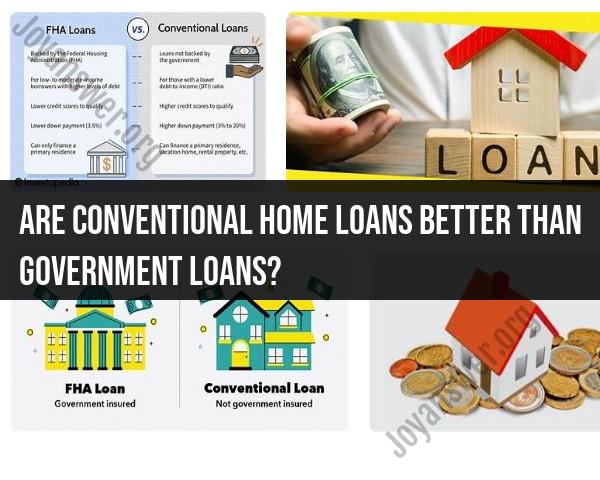Are conventional home loans better than government loans?
The choice between conventional and government-backed home loans depends on your individual financial situation, preferences, and eligibility. There isn't a one-size-fits-all answer as to whether conventional loans are better than government loans or vice versa. Each type of loan has its advantages and disadvantages, and the better option for you will depend on your specific circumstances. Here are some key factors to consider when making this decision:
Conventional Loans:
Advantages:
Lower Costs: Conventional loans often have lower upfront costs and ongoing expenses. They typically do not require mortgage insurance if you make a down payment of at least 20%.
Flexible Loan Terms: Conventional loans come with various loan term options, allowing you to choose a fixed-rate or adjustable-rate mortgage that suits your needs.
No Property Restrictions: Conventional loans do not have property location or condition restrictions, making them suitable for a wide range of property types.
Private Mortgage Insurance (PMI) Flexibility: If you make a down payment of less than 20%, you may need to pay PMI. However, PMI can be canceled once you reach a certain level of equity in your home.
Disadvantages:
Higher Credit Score Requirements: Conventional loans often require higher credit scores compared to some government loans.
Larger Down Payment: To avoid PMI, you generally need to make a down payment of at least 20%.
Government Loans (e.g., FHA, VA, USDA):
Advantages:
Lower Down Payment Requirements: Government loans typically offer lower down payment options, making homeownership more accessible to those with limited savings.
Lower Credit Score Requirements: Some government loans may accept lower credit scores compared to conventional loans.
Fixed Interest Rates: Government loans often come with fixed interest rates, providing stability and predictability in your monthly payments.
Assistance Programs: Certain government loan programs offer down payment assistance and other benefits to eligible borrowers.
Disadvantages:
Mortgage Insurance: Government loans may require upfront and ongoing mortgage insurance, increasing the overall cost of the loan.
Property Restrictions: Some government loans may have restrictions on the type, location, or condition of the property you can purchase.
Funding Fees: VA loans, for example, may require a funding fee, which is an additional cost for eligible veterans and service members.
Ultimately, the choice between a conventional and a government-backed loan should be based on your financial situation and goals. Consider factors such as your credit score, available down payment, property type, and long-term financial objectives. It's also a good idea to consult with a mortgage lender or financial advisor to help you determine the most suitable loan option for your specific circumstances. In some cases, it may be beneficial to explore both types of loans to see which one offers the best terms and affordability for your homeownership journey.
Are conventional home loans preferable to government-backed loans, and why?
Whether conventional home loans are preferable to government-backed loans depends on a number of factors, including your individual financial situation and needs. Some of the things to consider include:- Down payment: Conventional loans typically require a down payment of at least 20%, while government-backed loans, such as FHA loans and VA loans, allow for down payments as low as 3.5%.
- Credit score: Conventional loans typically require a higher credit score than government-backed loans.
- Interest rates: Interest rates on conventional loans are typically lower than interest rates on government-backed loans.
- Mortgage insurance: Conventional loans typically require borrowers to pay private mortgage insurance (PMI) if they make a down payment of less than 20%. Government-backed loans typically do not require PMI.
What are the advantages and disadvantages of conventional and government home loans?
Conventional loans
Advantages:
- Lower interest rates
- No mortgage insurance required with a down payment of 20% or more
- More flexible loan terms
- Less government involvement in the loan process
Disadvantages:
- Higher down payment requirements
- Higher credit score requirements
- More difficult to qualify for
- Private mortgage insurance required with a down payment of less than 20%
Government-backed loans
Advantages:
- Lower down payment requirements
- Easier to qualify for
- No private mortgage insurance required
Disadvantages:
- Higher interest rates
- More government involvement in the loan process
- Less flexible loan terms
How to decide between conventional and government loans for your home financing?
The best way to decide between conventional and government loans is to compare your individual financial situation and needs to the advantages and disadvantages of each type of loan. You should also talk to a qualified mortgage lender to get personalized advice.
Here are some general tips for deciding between conventional and government loans:
- Consider your down payment. If you have a down payment of 20% or more, a conventional loan may be the best option for you.
- Consider your credit score. If you have a high credit score, you may be able to qualify for a conventional loan with a lower interest rate than a government-backed loan.
- Consider your income and debt-to-income ratio. Government-backed loans may be more flexible for borrowers with lower incomes and higher debt-to-income ratios.
- Consider your future plans. If you plan to sell your home within a few years, a government-backed loan may not be the best option for you, as there may be prepayment penalties.
Ultimately, the best way to decide between conventional and government loans is to talk to a qualified mortgage lender who can help you compare your options and choose the loan that is right for you.






